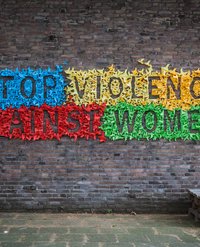Sexualised wartime violence
Violence against women and girls is an expression of discriminatory gender relationships. The rights, interests and needs of women, girls and people with other gender identities are not given the same priority as those of men and boys in patriarchal societies. Throughout the world, women and girls are denied their rights to self-determination as far as their own body is concerned. Sexualised and gender-based violence becomes established in times of peace, is exacerbated during armed conflict, and propagates in post-war societies. The use of rape as a strategic means to conduct a war is, in the end, a consequence of this injustice.
Sexualised violence and torture against women and girls are part of every war. Rapes during war are not limited to what happened during and after World War II, and the mass rapes in the Bosnian War in the early 1990s were by no means an inexplicable ‘one-off’. Sexualised violence is not only a particularly perverse form of conducting warfare: it is a terrifying, traumatising, everyday occurrence for women and children in many countries around the world.
Women have always been regarded by men as as "obvious" "spoils of war": their bodies symbolise the supposed honour of the men and their "violation" demonstrates power over them as opponents and shows superiority. Rape and torture of women are used in a targeted manner: to demoralise the opponent, for the purpose of ethnically-motivated displacement and as a means of social oppression. Therefore, the term "sexual violence" can be misleading: Rape is not an aggressive expression of sexuality, but a sexual expression of aggression (Translated from Ruth Seifert, Vergewaltigung und Krieg, 1993). The violence is sexualised. Sexualised violence serves to exert power and to control and oppress the other(s). Sexualised violence is not a petty offence – it is a serious human rights crime.
Sexualised wartime violence is a breach of international law. Governments are obliged to punish this crime. For most women and girls, it is simply unbearable when perpetrators are never brought to justice.
Societal consequences
Rape is often particularly cruel when it occurs during war. Many women suffer serious internal and external injuries – from vaginal and intestinal tears to pelvic fractures. Fistulas form on the genitals which can cause chronic pain in the womb for years and often lead to incontinence. Some injuries prevent the women from bearing any children. Others suffer from complications during pregnancy or birth. There is also a very high risk of contracting sexually transmitted diseases, in particular HIV/AIDS.
Psychosomatic causes are behind many severe complaints such as chronic headaches or womb pains, heart trouble or panic attacks. One of the reasons for psychosomatic complaints is the suppression of the experience of violence - something many women see themselves as being forced to do in order to avoid stigmatisation. In countries such as Kosovo, Afghanistan or the Democratic Republic of Congo, families with traditional values often see rape as an attack on the honour of the family or the husband. This means that there is tremendous pressure on the women not to let anyone else know it happened.







